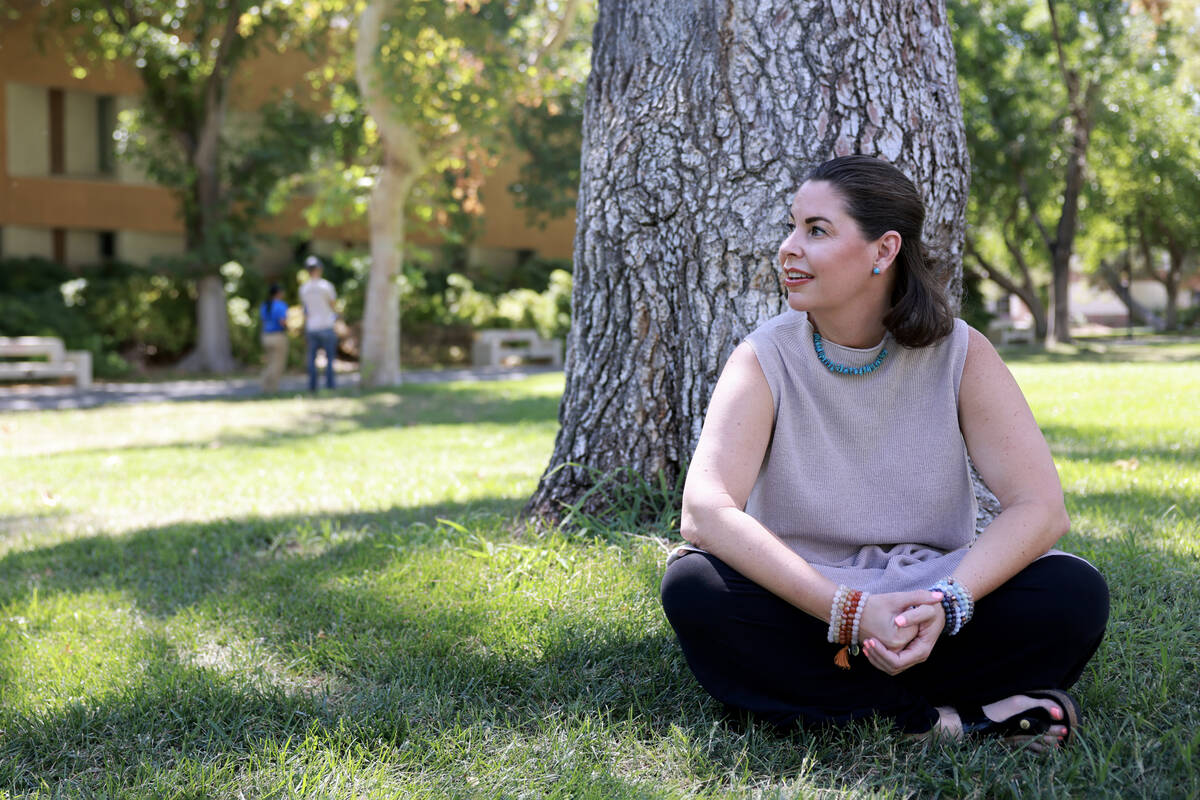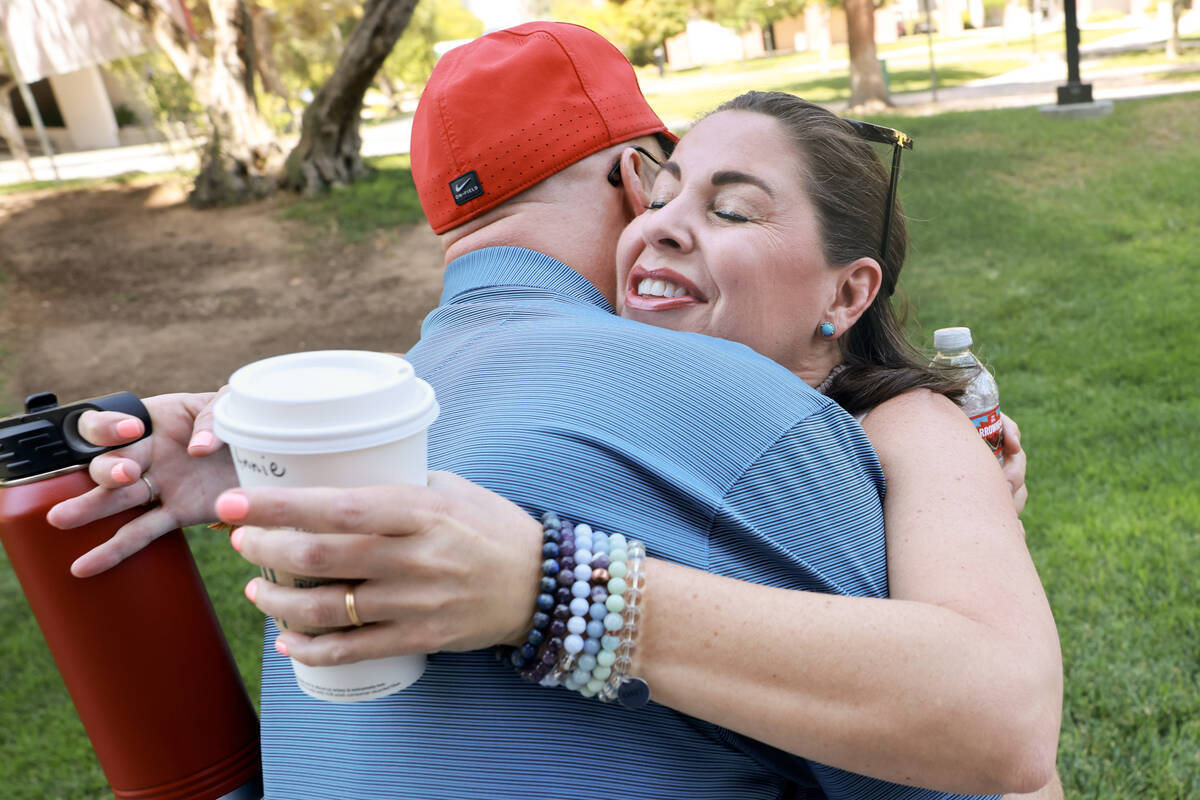Months after UNLV shooting, professors face their own mental health struggles
When UNLV Professor Daniel Bubb heard the alarms on Dec. 6, his first instinct was to go to the study room and get the students to safety.
“It was instinctive, just to make sure that my students were safe. I honestly didn’t think of myself,” Bubb told the Review-Journal.
It was not until hours after the the UNLV shooting that killed three professors and seriously injured another person that Bubb broke down himself.
“I was so focused on making sure our students were safe, that I had a delayed reaction to it later that night when the reality set in,” he said.
Bubb, the coordinator of academic affairs for UNLV, said he is doing better now, but the effects still linger. He is more alert, and he finds himself looking over his shoulder more.
Bubb is not alone. Almost eight months after the shooting, many professors struggle with their mental health, all while attempting to care for students who face their own mental health crises. UNLV has offered increased resources since the shooting, but many professors feel as though the tragedy only exacerbated the issues they face in an already isolating and demanding job.
‘Not a fear that I had before the shooting’
UNLV professor Adrianna Munson said she still finds herself unwillingly suspicious of her students, as though they could be a potential threat.
“It’s very uncomfortable to feel like I’m trying to support and educate a student, and at the same time they leave to go to the bathroom, and I’m worried they’re going to come back with a gun. And that’s not a fear that I had before the shooting,” she said.
Professors’ mental health concerns also come at a time when students at colleges and universities face a mental health crisis. Bubb, for instance, co-advises Project Wellness, a student group at UNLV that introduced after students called for more mental health support.
Munson teaches a course on the sociology of mental health, and blamed much of the student mental health crisis she sees on a culture that demands high achievers.
“We as faculty are responsible for all of that, and we have all of that inside of us when we’re thinking about how to teach. And individual faculty can’t break those stigmas,” Munson said. “But I think, institutions, there’s a lot of things they could do to normalize getting help.”
But some faculty members find themselves in a double bind. They are tasked with caring for students, but at the same time lack support for themselves.
“I think historically, mental health, wellness, all that stuff has been so student-focused at universities,” said Anne Weisman, who directs the Well-Being Program.
“We’ve really missed the opportunity to care for our entire community. And I think that that’s changing, and has changed with COVID and the murders on our campus and all of the things that we experienced as a community.”
Resources available
Since December, UNLV has increased its resources. The Rebel Recovery Program, launched by President Keith Whitfield, includes town halls and safety training, among other mental health resources. UNLV also has a page on its website that offers professors guidelines on how to teach after a traumatic event.
The university also recently received funding for a wellness manager, according to Ericka Smith, the university’s vice president for human resources. She said more people have been using the employee assistance program at the university.
“We’ve encouraged people that it’s OK not be OK, and to talk about it,” Smith told the Review-Journal.
The university has also offered reimbursements of up to $1,500 for each employee for mental health costs between Dec. 7 and Sept. 1. The total amount available for reimbursement is $300,000, according to Keyonna Summers, the media relations manager for the university.
But UNLV Professor William Robinson said the total offered was not enough and that it shouldn’t be the burden of professors to find outside help. Instead, he wished the university had more counselors available. He added that many professors seemed unaware of the resources that were available to them.
Robinson was grateful professors were not required to teach in Beam Hall, where the shooting took place. The university announced that the building will reopen Aug. 13.
‘Really isolating’
While UNLV has offered resources since the shooting, some professors feel as though the problem extends beyond one event.
“Being a professor can be really isolating,” Weisman said, citing the tough workload in particular.
University of Nevada, Reno professor Marta Elliott has dedicated her career to researching mental health, most recently narrowing in on academia. She was inspired by her own experience of being very successful in academia, yet encountering discrimination when it came to her issues with mental health. Elliott has since made it her goal to be vocal about health issues in order to get better representation for those with disabilities or mental health fragilities.
Across the people she interviewed, she found a common theme: silence. Many professors told her that they use a physical injury in order to access paid leave for their mental health struggles.
Other professors told her they experienced prejudice from human resources — the very department, Elliott said, that is designed to help them. Many professors with mental health concerns, she found, end up leaving due to lack of support.
“There are just many, many brilliant scholars and teachers with mental health problems,” Elliott said. “I think it’s a great loss, just because you lose that talent, but also because those people can inspire students who also have mental health problems.”
Moving forward with hope
When it comes to resources, Elliott said it is important for people to have counselors and supportive people on campus, but what she really wants is to incorporate well being in a day-to-day basis.
“We aren’t encouraged to take care of ourselves, or if we are, it’s just, ‘take care of yourselves, but you still have to do x, y and z to be successful,’ and it’s kind of incompatible,” Elliott said. “The message needs to be, ‘we’re going to embed taking care of yourself into your work.’”
Still, Elliott said, she is hopeful for the future.
“We’re on our way. I’m very hopeful. I’m happy to be part of the solution. It exists. We’re moving forward together,” Elliot said.
Contact Katie Futterman at kfutterman@reviewjournal.com.



















